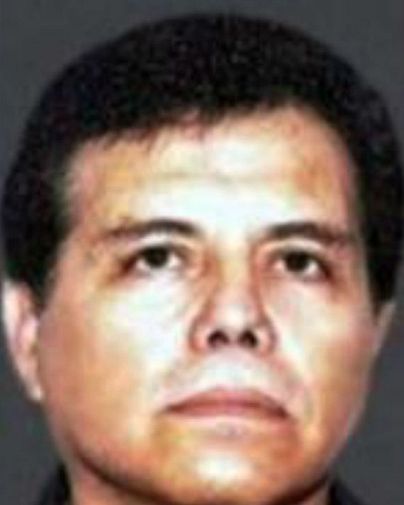"The conviction though has done nothing to impact the Sinaloa cartel because it remains the most powerful cartel in Mexico," one expert said.
The Sinaloa cartel "remains the most powerful" drug trafficking organization in Mexico despite the conviction of infamous drug lord Joaquin "El Chapo" Guzmán, experts said.
"The conviction of Chapo Guzmán was a great moral victory because it subjected him to the rule of law," Mike Vigil, the former chief of international operations for the Drug Enforcement Administration, told NBC News Wednesday.
"The conviction though has done nothing to impact the Sinaloa cartel because it remains the most powerful cartel in Mexico," he said.
Guzmán, 61, was found guilty Tuesday on all 10 charges he faced for crimes spanning more than a quarter of a century. Those charges included engaging in a continuing criminal enterprise and multiple counts of distributing large amounts of narcotics internationally. Guzmán, famous for his two prior prison escapes in Mexico, now faces life in prison and will likely be sent to a federal "supermax" facility in the U.S.
Despite the spectacle of Guzmán's trial in the U.S., the Mexican strategy of going after notorious "kingpins" has only increased the violence by splintering cartels that then fight over territory, said Guadalupe Correa-Cabrera, a professor of policy and government at George Mason University.
"We have had so many narcos dead or arrested and extradited to the United States and what are the implications of that? None," she said. "It's irrelevant because we have seen this so many times repeating itself."In the wake of Guzmán's arrest and extradition to the U.S., the cartel has been headed by Ismael "El Mayo" Zambada, "one of the oldest remaining drug capos," or drug lords, and a longtime associate of Guzmán, according to Vigil.
Sinaloa's main rival, the Jalisco New Generation cartel, has grown in Guzmán's absence, but still faces internal power struggles and a crackdown from law enforcement after several high-profile episodes of violence, he said.
Vigil said the Sinaloa cartel has maintained a strong leadership that has prospered under a more "horizontal structure," where "decision-making authority flows all along the chain."Adding to the cartel's ongoing success was a "diversified portfolio" of criminal activity, Vigil said, which includes a lucrative drug trade which has now expanded to include synthetic opioids, as well as extortion, kidnapping and theft of petroleum from Mexico's pipelines.
Last month, U.S. authorities seized at a border checkpoint what they said was the largest seizure in U.S. history of fentanyl, the deadly synthetic opioid.
Vigil said he predicted fentanyl could be "the way for the future" for the cartel. The cartel can purchase a kilo of the drug from China for less than $10,000 and fentanyl is up to 50 times more powerful than heroin, he said.
The variation in criminal activity makes the cartel "very resilient to law enforcement efforts because if they take a major hit they're still generating so much money," Vigil said.
Zambada remains further out of reach of law enforcement than Guzmán did by remaining in Mexico's mountainous region between the Mexican states of Durango and Sinaloa, Vigil said. A helicopter offensive would be heard for miles and rings of security at the ground level make a raid to capture Zambada incredibly difficult, he said.
"The reason Chapo Guzmán was captured is because he has an obsession with women and he decided to come down from the mountains and into the mouth of the lobo," or into the mouth of the wolf, by going into the city, he said.
Correa-Cabrera said a history of impunity for those aiding and abetting the cartel has left Mexicans frustrated. While Mexican government or law enforcement officials are implicated in the U.S. trials, as was the case in Guzmán's, there has been a lack of follow through investigations by Mexican authorities, she said.
In one of the more stunning days of testimony, Guzman's personal secretary alleged that the boss paid a $100 million bribe to former Mexican President Enrique Peña Nieto. (Peña Nieto denied it).
Correa-Cabrera said that as a result of the fragmentation of smaller cartels, local criminals have also turned to increasingly violent forms of financial gain, such as extortion and kidnapping.
Last year was the deadliest on record for Mexico with more than 33,300 murders, according to a report, a 15 percent increase from 2017.
Meanwhile, the new government of President Andrés Manuel López Obrador has signaled a change in direction, vowing to fight corruption but also deviating from the strategy of hunting down kingpins.
"We haven't arrested capos, because that is not our main function," López Obrador said on Jan. 30, according to The Associated Press. "The government's main function is to guarantee public safety, and the strategy is no longer to carry out raids to capture capos."
Vigil said, "López Obrador has his work cut out for him simply because corruption is endemic in Mexico, especially at the state and municipal level."
The Mexican president "has six years and I don't think that going to be enough time for him to deal with it or really have a massive impact," he said.
While the Sinaloa cartel remains powerful, Guzmán's conviction highlighted the power of law enforcement holding such high-profile criminals accountable, said Andrew Hogan, a former DEA agent who tracked and captured Guzmán in 2014 and author of "Hunting El Chapo."
"I think the larger message here is that it shows the world that no one immune from the law," he said.

